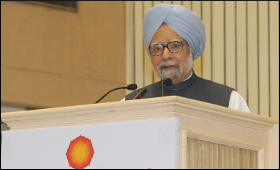|

|
Need to push exports, weak rupee will help: PM
|
|

|
| Prime Minister, Dr. Manmohan Singh addressing the 92nd Annual General Meeting of ASSOCHAM, in New Delhi on July 19. |
| Top Stories |
 |
|
|
|
SME Times News Bureau | 19 Jul, 2013
Prime Minister Manmohan Singh Friday said, on the supply side, we need to push our exports and added that the weak rupee will help exports.
"On the supply side, we need to push our exports. The depreciation in the rupee will help," Manmohan Singh said addressing the annual general meeting of industrial chamber ASSOCHAM in the national capital.
He said, "Of course, there is a time lag before this benefit will be felt in terms of export volumes, but orders being booked from now on would certainly benefit."
"We are also trying to remove the constraints in the export of iron and other ores which saw a considerable decline during the last one year," he added.
He also said, the rupee depreciation will help Indian industry to compete effectively with other countries, both in export markets and against their imports in our markets.
Beginning his address with the biggest challenge of global economic slowdown, Dr Singh said, "We, like most other countries, are going through a difficult period. I know that business is deeply concerned about the slowdown in our economy. It is looking to the government to bring the economy back to a higher growth path. This, I believe, is a legitimate expectation and is also upper most in our mind."
He assured the industry that his government is taking action to improve the economy. "When things are going well, government should interfere as little as possible. When things are going bad, as they seem to be at present, it is the responsibility of the Government to become more pro-active," he said.
"The most immediate cause of worry is the recent volatility in foreign exchange markets. Much of this was due to global markets reacting to the likelihood of a withdrawal of Quantitative Easing III by the US Federal Reserve Bank. Large volumes of funds were withdrawn from emerging markets and there was a depreciation in many emerging market countries including Turkey, Brazil and South Africa," he added.
PM said that he has experienced a significant depreciation in the exchange value of the rupee. "In our case, it was perhaps exacerbated by the fact that our current account deficit in the balance of payment had increased to 4.7 percent of GDP in 2012-13."
He assured industry that he is committed to bringing the current account deficit under control by addressing both the demand side and the supply side of the problem. "On the demand side, we need to reduce the demand for gold and the demand for petroleum products - the two biggest components of our trade deficit," he said.
Commenting on the recent downfall in the figures of industrial output, he said, "Industrial growth has not yet recovered. However, I am happy to say that agriculture looks well set to show a good performance. In fact, one of the important achievements of our Government is that agricultural performance has improved considerably. In the Tenth Plan period agriculture grew at 2.4 percent. In the Eleventh Plan period it grew at the rate of 3.6 percent. In the Twelfth Plan we have targeted 4 percent growth for our agricultural sector."
"I am hopeful that the current year, with the rains being plentiful thus far, agriculture will do well. This will help revive demand in rural areas which will contribute to stronger industrial performance in due course," said Dr Singh.
"I must emphasise that it is not the exact growth number for 2013-14 that matters. What is important is that the economy should turn around from 5 percent achieved last year. There is a very good chance that we can achieve that with good agricultural performance and the effect of the various actions we are taking on infrastructure," he added.
|
|
|
| |
|
|
|
|
|
|
|
|
|
|
|
|
|
|
| |
| Customs Exchange Rates |
| Currency |
Import |
Export |
US Dollar
|
84.35
|
82.60 |
UK Pound
|
106.35
|
102.90 |
Euro
|
92.50
|
89.35 |
| Japanese
Yen |
55.05 |
53.40 |
| As on 12 Oct, 2024 |
|
|
| Daily Poll |
 |
 |
| Do you think Indian businesses will be negatively affected by Trump's America First Policy? |
|
|
|
|
|
| Commented Stories |
 |
|
|
|
|
|
| |
|